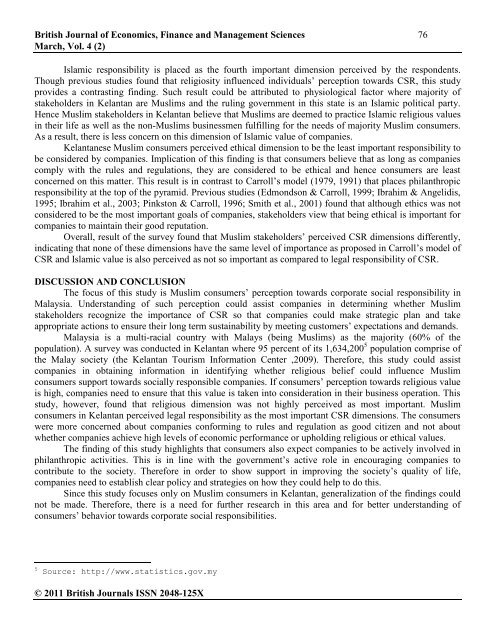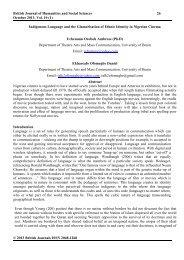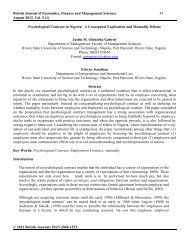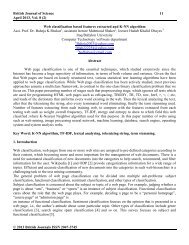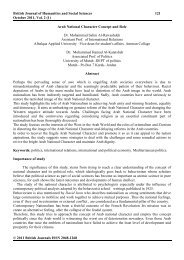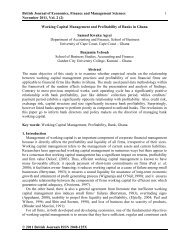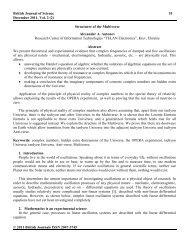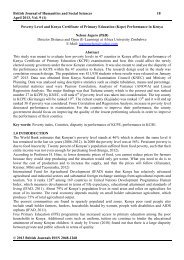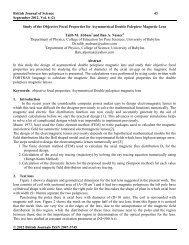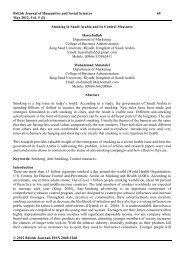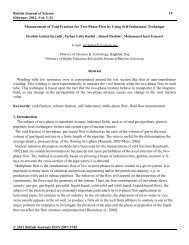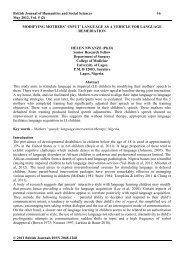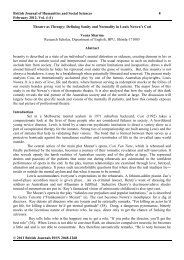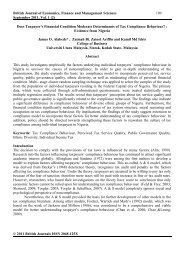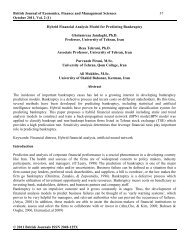the perception of muslim consumers towards corporate social ...
the perception of muslim consumers towards corporate social ...
the perception of muslim consumers towards corporate social ...
Create successful ePaper yourself
Turn your PDF publications into a flip-book with our unique Google optimized e-Paper software.
British Journal <strong>of</strong> Economics, Finance and Management Sciences 76March, Vol. 4 (2)Islamic responsibility is placed as <strong>the</strong> fourth important dimension perceived by <strong>the</strong> respondents.Though previous studies found that religiosity influenced individuals‟ <strong>perception</strong> <strong>towards</strong> CSR, this studyprovides a contrasting finding. Such result could be attributed to physiological factor where majority <strong>of</strong>stakeholders in Kelantan are Muslims and <strong>the</strong> ruling government in this state is an Islamic political party.Hence Muslim stakeholders in Kelantan believe that Muslims are deemed to practice Islamic religious valuesin <strong>the</strong>ir life as well as <strong>the</strong> non-Muslims businessmen fulfilling for <strong>the</strong> needs <strong>of</strong> majority Muslim <strong>consumers</strong>.As a result, <strong>the</strong>re is less concern on this dimension <strong>of</strong> Islamic value <strong>of</strong> companies.Kelantanese Muslim <strong>consumers</strong> perceived ethical dimension to be <strong>the</strong> least important responsibility tobe considered by companies. Implication <strong>of</strong> this finding is that <strong>consumers</strong> believe that as long as companiescomply with <strong>the</strong> rules and regulations, <strong>the</strong>y are considered to be ethical and hence <strong>consumers</strong> are leastconcerned on this matter. This result is in contrast to Carroll‟s model (1979, 1991) that places philanthropicresponsibility at <strong>the</strong> top <strong>of</strong> <strong>the</strong> pyramid. Previous studies (Edmondson & Carroll, 1999; Ibrahim & Angelidis,1995; Ibrahim et al., 2003; Pinkston & Carroll, 1996; Smith et al., 2001) found that although ethics was notconsidered to be <strong>the</strong> most important goals <strong>of</strong> companies, stakeholders view that being ethical is important forcompanies to maintain <strong>the</strong>ir good reputation.Overall, result <strong>of</strong> <strong>the</strong> survey found that Muslim stakeholders‟ perceived CSR dimensions differently,indicating that none <strong>of</strong> <strong>the</strong>se dimensions have <strong>the</strong> same level <strong>of</strong> importance as proposed in Carroll‟s model <strong>of</strong>CSR and Islamic value is also perceived as not so important as compared to legal responsibility <strong>of</strong> CSR.DISCUSSION AND CONCLUSIONThe focus <strong>of</strong> this study is Muslim <strong>consumers</strong>‟ <strong>perception</strong> <strong>towards</strong> <strong>corporate</strong> <strong>social</strong> responsibility inMalaysia. Understanding <strong>of</strong> such <strong>perception</strong> could assist companies in determining whe<strong>the</strong>r Muslimstakeholders recognize <strong>the</strong> importance <strong>of</strong> CSR so that companies could make strategic plan and takeappropriate actions to ensure <strong>the</strong>ir long term sustainability by meeting customers‟ expectations and demands.Malaysia is a multi-racial country with Malays (being Muslims) as <strong>the</strong> majority (60% <strong>of</strong> <strong>the</strong>population). A survey was conducted in Kelantan where 95 percent <strong>of</strong> its 1,634,200 5 population comprise <strong>of</strong><strong>the</strong> Malay society (<strong>the</strong> Kelantan Tourism Information Center ,2009). Therefore, this study could assistcompanies in obtaining information in identifying whe<strong>the</strong>r religious belief could influence Muslim<strong>consumers</strong> support <strong>towards</strong> <strong>social</strong>ly responsible companies. If <strong>consumers</strong>‟ <strong>perception</strong> <strong>towards</strong> religious valueis high, companies need to ensure that this value is taken into consideration in <strong>the</strong>ir business operation. Thisstudy, however, found that religious dimension was not highly perceived as most important. Muslim<strong>consumers</strong> in Kelantan perceived legal responsibility as <strong>the</strong> most important CSR dimensions. The <strong>consumers</strong>were more concerned about companies conforming to rules and regulation as good citizen and not aboutwhe<strong>the</strong>r companies achieve high levels <strong>of</strong> economic performance or upholding religious or ethical values.The finding <strong>of</strong> this study highlights that <strong>consumers</strong> also expect companies to be actively involved inphilanthropic activities. This is in line with <strong>the</strong> government‟s active role in encouraging companies tocontribute to <strong>the</strong> society. Therefore in order to show support in improving <strong>the</strong> society‟s quality <strong>of</strong> life,companies need to establish clear policy and strategies on how <strong>the</strong>y could help to do this.Since this study focuses only on Muslim <strong>consumers</strong> in Kelantan, generalization <strong>of</strong> <strong>the</strong> findings couldnot be made. Therefore, <strong>the</strong>re is a need for fur<strong>the</strong>r research in this area and for better understanding <strong>of</strong><strong>consumers</strong>‟ behavior <strong>towards</strong> <strong>corporate</strong> <strong>social</strong> responsibilities.5Source: http://www.statistics.gov.my© 2011 British Journals ISSN 2048-125X


